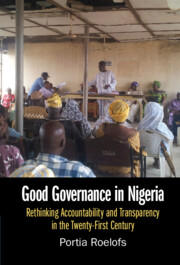Book contents
- Good Governance in Nigeria
- Good Governance in Nigeria
- Copyright page
- Dedication
- Epigraph
- Contents
- Figures
- Tables
- Acknowledgements
- Abbreviations
- Major Characters
- Map of Nigeria
- Additional material
- Introduction
- 1 Contested Legacies of Good Governance
- 2 Good Governance, What’s Not to Love?
- 3 Be Accessible! Accountability, Performance and the Politician Who Is ‘Always in a Meeting’
- 4 Theorising Accountability as Accessibility
- 5 Transparency in People
- 6 Socially Embedded Good Governance
- Conclusion
- Appendix: Methods and Methodology
- Glossary of Yoruba Terms
- Select Bibliography
- Index
4 - Theorising Accountability as Accessibility
Communication, Social Sanctions and the Limits of Principal–Agent Models
Published online by Cambridge University Press: 13 April 2023
- Good Governance in Nigeria
- Good Governance in Nigeria
- Copyright page
- Dedication
- Epigraph
- Contents
- Figures
- Tables
- Acknowledgements
- Abbreviations
- Major Characters
- Map of Nigeria
- Additional material
- Introduction
- 1 Contested Legacies of Good Governance
- 2 Good Governance, What’s Not to Love?
- 3 Be Accessible! Accountability, Performance and the Politician Who Is ‘Always in a Meeting’
- 4 Theorising Accountability as Accessibility
- 5 Transparency in People
- 6 Socially Embedded Good Governance
- Conclusion
- Appendix: Methods and Methodology
- Glossary of Yoruba Terms
- Select Bibliography
- Index
Summary
The previous chapter demonstrated how politicians and voters in southwest Nigeria value accessibility as a form of accountability: in order to be accountable, leaders should maintain spaces for direct face-to-face communication with their constituents. This chapter builds on further empirical examples to give a theoretical account of accountability as accessibility and argues that it helps reveal the ontological limits of dominant scholarly approaches to accountability, namely, principal–agent models. It starts by asking what makes communication an intrinsically valuable part of accountability. Theories stressing the power of communication in the public sphere to confer recognition and dignity on citizens are considered and found to capture part of the lived experience of accessibility. However, they neglect the way accessibility draws on social sanctions to constrain rulers in the context of unequal power relations. A review of the historical roots of the principal–agent models in liberal theory explains why dominant theories struggle to accommodate the sanctioning power of communication. More generally, the assumed desirability of an anonymous and impersonal modern state leads to a neglect of the more socially embedded aspects of governance. In contrast, Yoruba political vocabulary fluently expresses the political importance of social sanction via the concept of olá (social honour).
Keywords
- Type
- Chapter
- Information
- Good Governance in NigeriaRethinking Accountability and Transparency in the Twenty-First Century, pp. 175 - 206Publisher: Cambridge University PressPrint publication year: 2023

